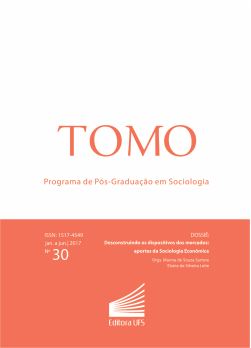TripAdvisor’s Collective Representation on Beach Bars: the case of Aracaju-Sergipe
DOI:
https://doi.org/10.21669/tomo.v0i0.6716Abstract
In Aracaju, Brazil, beach bars are a major touristic attraction. In this article, reviews of beach bars published in TripAdvi- sor are considered as Collective Representations expressing a shared agreement about what it means to go to a bar on the beach sand. Two hundred reviews concerning the two best TripAdvisor ranked beach bars in Aracaju were manu- ally analysed. The resulting framework gives emphasis to be- ach bars’ food, service and structure and is also permeated by descriptions about the user’s experience and their general impression of the bar. Reviews regarding prices and the loca- tion are marginal. The least cited aspect concerning the beach bars were their surroundings, such as the sea and the beach, demonstrating a direct association with consumption in the bars, as well as a dissociation with the perception of an inte- raction with nature.Downloads
Downloads
Published
How to Cite
Issue
Section
License
TOMO journal adopts the Creative Commons CC-BY 4.0 license which allows:
• Share: copy and redistribute the material in any medium or format.
• Adapt: remix, transform, and create from the material for any purpose, even commercial.
Authors who publish in this journal agree to the following terms:
a) Authors retain copyright and grant the journal the right of first publication, with the work simultaneously licensed under the Creative Commons which allows sharing the work with acknowledgment of authorship and initial publication in this journal.
b) Authors are authorized to assume additional contracts separately, for non-exclusive distribution of the version of the work published in this journal (eg, publishing in an institutional repository or as a book chapter), with acknowledgment of authorship and initial publication in this journal.
c) Authors are allowed and encouraged to publish and distribute their work online (e.g., in institutional repositories or on their personal page) at any point before or during the editorial process, as this can generate productive changes, as well as increase the impact and citation of the published work (O Efeito do Acesso Livre).







 The manuscripts from thsi journals are licenced by CC BY.4.0.
The manuscripts from thsi journals are licenced by CC BY.4.0. 